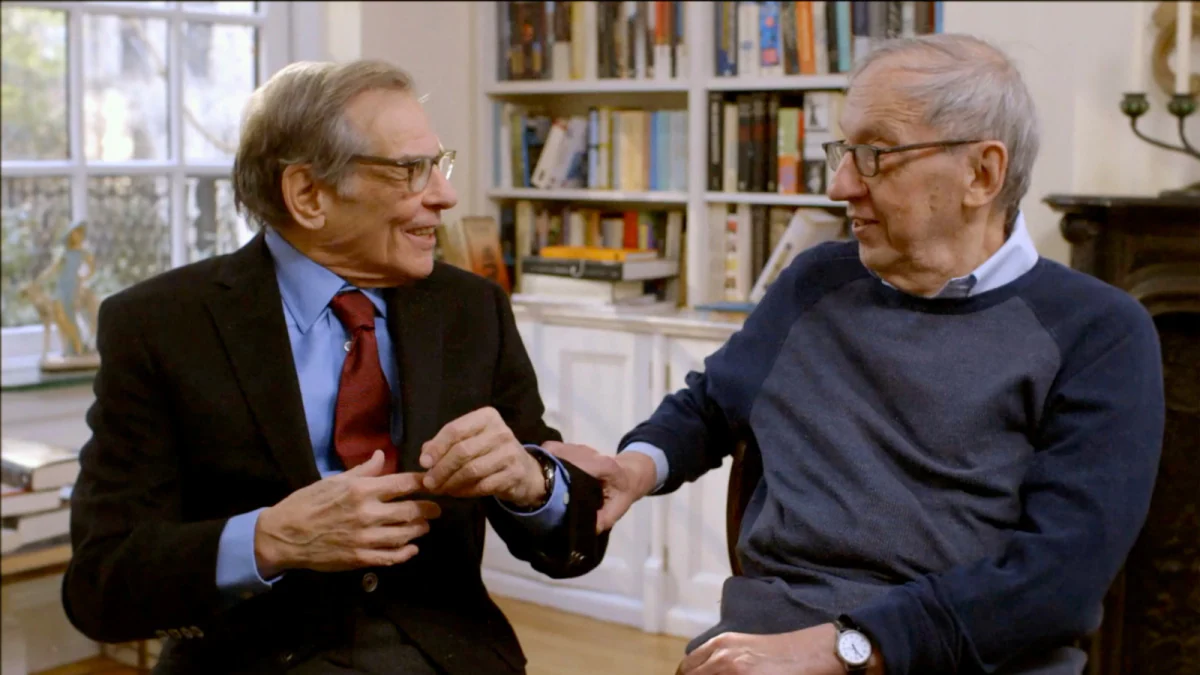For a Robert Caro fan like myself, waiting for the Pulitzer Prize–winning author’s fifth volume in his monumental LBJ biography (which launched in 1982) is a condition best described as managing intense anticipation for the continuation of our greatest living storyteller’s magnum opus, and an ever-sobering grasp of mortality: Caro is 86.
True, we can’t hurry excellence, especially one committed to pencils, a typewriter, and carbon paper. But if people like me are chomping, what must his longtime editor Robert Gottlieb be thinking? He just turned 91!
The book world’s most formidable duo for more than 50 years — since they first teamed on Caro’s reputation-making political biography “The Power Broker” — is the subject of “Turn Every Page,” one of the better documentaries about researching, writing, and reading, directed by Gottlieb’s daughter Lizzie.

Dyed-in-the-wool New Yorkers and devotees of the written word, the gentlemanly, soft-spoken Caro and the self-possessed, wry Gottlieb are more partnership than friendship, but their importance to each other is, as presented by so close an observer, affecting in the manner of a love story. These are, after all, two people who see each other, understand each other, and argue passionately because of it.
It’s sort of charming, in fact, that, as Lizzie Gottlieb narrates, they didn’t want to be interviewed together. It could be about ego. It could be respect for the breadth of their achievements. Or perhaps they just didn’t want a camera to potentially capture one of their legendarily heated exchanges about Caro’s semicolon use. (Which becomes a collegial proxy skirmish anyway, in their separate sit-downs and through interviews with publishing luminaries like David Remnick, author Colm Tóibín, and New Yorker “comma queen” Mary Norris.)
And yet this bond was forged in the difficult process of protecting a writer’s hard work through necessary slashing and shaping. In 1970, Caro was a dedicated Newsday journalist wrapping up years investigating the unreported story of Robert Moses, the shrewd public-authority titan who physically shaped New York as we know it, for better (beaches, expressways) and worse (destroyed neighborhoods), acquiring and consolidating power like a shadow emperor. When Gottlieb took Caro on, he was the publishing wunderkind who’d edited Doris Lessing, “True Grit,” and discovered Joseph Heller’s “Catch-22.”

Together, a two-foot-high manuscript about a little-known city builder was reduced by 350,000 words, and now “The Power Broker” (still a doorstop, and this reviewer’s desert-island choice of book) is in its 41st printing, taught in schools, and, as the younger Gottlieb amusingly depicts, every well-read Zoom cable-news interviewee’s favorite backdrop totem. The two independently arrived at Lyndon B. Johnson as Caro’s next great window into political power.
Forty-eight years, multiple trips to the LBJ library in Austin (to which the camera follows him), and countless awards later, Caro remains committed to chronicling the 36th president’s controversial, consequential life; it’s a mission that still sends Caro into a modest Manhattan office every day and often into Central Park for cogitating strolls (that used to be runs). Gottlieb, meanwhile, has edited everyone from Toni Morrison and Michael Crichton to Cynthia Ozick and Bill Clinton, ran The New Yorker for a stretch, written his own books, and programmed ballet companies. And waited, and waits, for Caro’s pages.
The movie does a wonderful job, through its subjects’ anecdotes and fans’ testimony, of conveying the throughline of deep consideration and attention to detail that emblemizes Caro’s you-are-there narrative style — at one point, read aloud on-camera by Ethan Hawke — and Gottlieb’s compassionate editing of it. If empathy is what drives Caro to devote an entire chapter to how Moses impacted marginalized communities, or compels him to move to Texas for three years to capture the Hill Country poverty that fortified Johnson’s impactful liberalism, then Gottlieb sees the editor’s essential quality as sympathy for his author’s empathy, an enthusiasm that makes the work better. In trying to change what a work is, says Gottlieb, “tragedy lurks.”

We also get glimpses at how much their lives have been enriched by their longtime spouses: Caro’s wife Ina is, he tells us in his New York accent, the only researcher he trusts, while Gottlieb’s wife (and the director’s actress mother) Maria Tucci is a joyfully supportive partner, if not so crazy about her husband’s penchant for collecting Lucite mid-century ladies’ handbags.
The bad news about “Turn Every Page” is the no-news part, and Caro is too polite to tell everyone to please stop asking when he’ll be finished. (He simply calls it his least favorite question.) But Lizzie Gottlieb has made too warm, admirably reverent, and insightful a film to hinge its appeal on a due date. Rather, she delivers what she initially thought she might not get: a closing scene of this post-golden-anniversary marriage in action, these literary titans trimming the fat, celebrating the discoveries, and likely rehashing old battles.
The sound’s off (at their request) so we can’t know the details. But we’ll get them in the next volume, and our understanding of American power, pain, and possibility will be better for it.
“Turn Every Page makes its world premiere at the 2022 Tribeca Festival.


